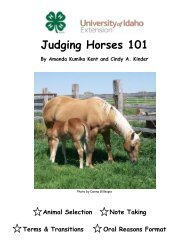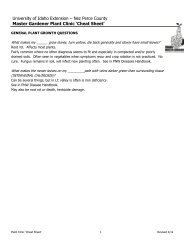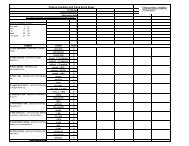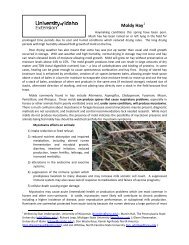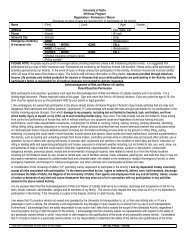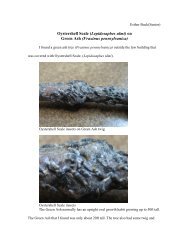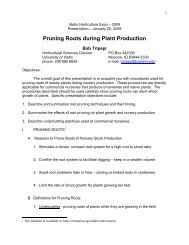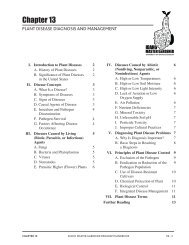Black Flies - Biology and Control - University of Idaho Extension (Ver ...
Black Flies - Biology and Control - University of Idaho Extension (Ver ...
Black Flies - Biology and Control - University of Idaho Extension (Ver ...
You also want an ePaper? Increase the reach of your titles
YUMPU automatically turns print PDFs into web optimized ePapers that Google loves.
Never use DEET products on pets, horses or on livestock animals because they will ingest the<br />
chemical when they groom themselves.<br />
Natural alternatives to DEET are available <strong>and</strong> include plant oils (cedarwood, citronella, eucalyptus)<br />
<strong>and</strong> IR3535 (technically known as 3-[N-butyl-N-acetyl]-aminopropionic acid, ethyl ester), a chemical<br />
related to an essential naturally occurring amino acid. Table 1 lists the names <strong>of</strong> products available<br />
in <strong>Idaho</strong>. Tests with mosquitoes have shown that the plant oil products provide lesser protection than<br />
DEET; it is safe to assume that they are similarly less effective than DEET against black flies.<br />
TABLE 1. Alternatives to DEET for black fly repellents in <strong>Idaho</strong><br />
trade name % active ingredient manufacturer signal words<br />
products that contain IR3535<br />
SKIN-SO-SOFT Bug Guard PLUS IR3535 Insect Repellent Moisturizing Sunblock Lotion SPF 30 7.5% Avon Products caution<br />
SKIN-SO-SOFT Bug Guard PLUS IR3535 Expedition Insect Repellent Aerosol 20.1% Avon Products warning<br />
SKIN-SO-SOFT Bug Guard PLUS IR3535 Insect Repellent Moisturizing Lotion 7.5% Avon Products caution<br />
SKIN-SO-SOFT Bug Guard PLUS IR3535 Insect Repellent Spray 7.5% Avon Products caution<br />
Bug Guard Plus IR3535 Active Insect Repellent Gentle Breeze Towelettes 7.5% Avon Products warning<br />
products that contain cedarwood oil <strong>and</strong> oil <strong>of</strong> citronella<br />
BUG BLOCK SUNSCREEN AND INSECT REPELLENT 0.5% <strong>and</strong> 4.2% W F Young Inc caution<br />
products that contain oil <strong>of</strong> eucalyptus<br />
REPEL LEMON EUCALYPTUS INSECT REPELLENT LOTION 30% WPC Br<strong>and</strong>s warning<br />
REPEL LEMON EUCALYPTUS INSECT REPELLENT SPRAY LOTION 30% WPC Br<strong>and</strong>s warning<br />
SURVIVOR LEMON EUCALYPTUS INSECT REPELLENT 30% WPC Br<strong>and</strong>s warning<br />
REPEL PLANT BASED LEMON EUCALYPTUS INSECT REPELLENT 40% WPC Br<strong>and</strong>s caution<br />
products that contain p-Menthane-3,8-diol<br />
OFF! BOTANICALS TOWELETTES 8% SC Johnson & Son caution<br />
OFF! BOTANICALS INSECT REPELLENT 10% SC Johnson & Son caution<br />
TABLE NOTES:<br />
(1) Signal words designate the relative risk a pesticide will cause harmful health effects on humans, where caution = slightly toxic, warning = moderately<br />
toxic, <strong>and</strong> danger = most toxic. The U.S. Environmental Protection Agency (EPA) considers all products listed here to pose little acute risks to human<br />
health except for possible eye irritation.<br />
(2) Avon product line includes additional IR3535 repellents not listed here that differ with respect to fragrance <strong>and</strong>/or sunscreen content.<br />
(3) p-Menthane-3,8-diol naturally occurs in the leaves <strong>and</strong> twigs <strong>of</strong> the lemon eucalyptus plant but is chemically synthesized for commercial use.<br />
Electronic devices that claim to repel insect by emitting ultrasonic sounds or electromagnetic signals have<br />
no value for alleviating black fly nuisance. More than 25-years <strong>of</strong> scientific research has shown that these<br />
devices do not repel any insect. Potentially more useful are the backyard mosquito traps (eg., Mosquito<br />
Magnet <strong>and</strong> many other br<strong>and</strong>s) that emit plumes <strong>of</strong> carbon dioxide <strong>and</strong> other attractants. These devices<br />
really do lure <strong>and</strong> kill mosquitoes <strong>and</strong> so likely attract <strong>and</strong> trap black flies too, but it remains to be seen if<br />
these devices trap enough insects to reduce pests to tolerable levels.<br />
Insecticides can be applied as aerosol fogs or as light mists in backyard areas to kill black flies as they rest<br />
on plants <strong>and</strong> buildings. However, except for the most extreme black fly infestations, we recommend<br />
against such applications. At best, backyard premise sprays only provide temporary relief that lasts no<br />
more than a few days. <strong>Flies</strong> that arrive after insecticides evaporate will not be killed. Further, the<br />
Page 8 <strong>of</strong> 12



